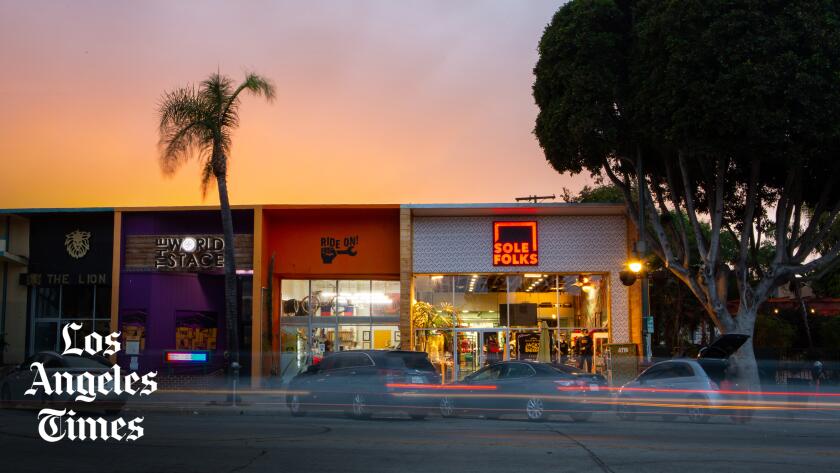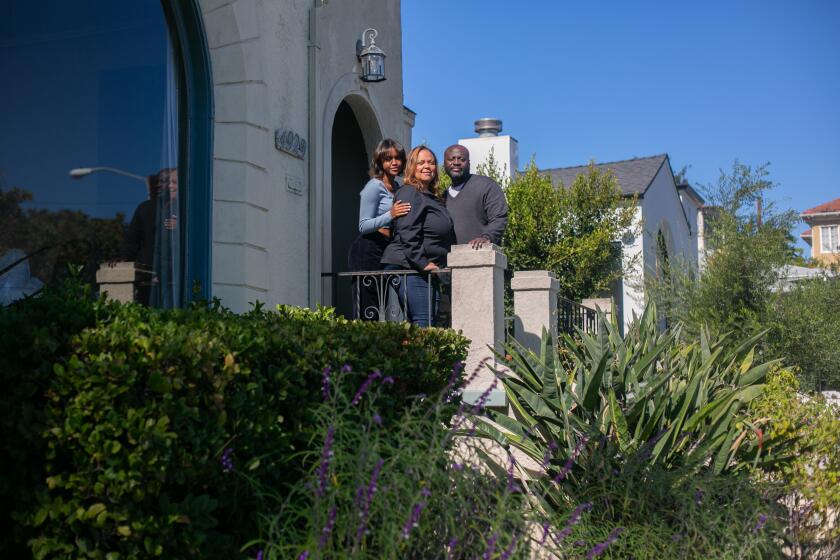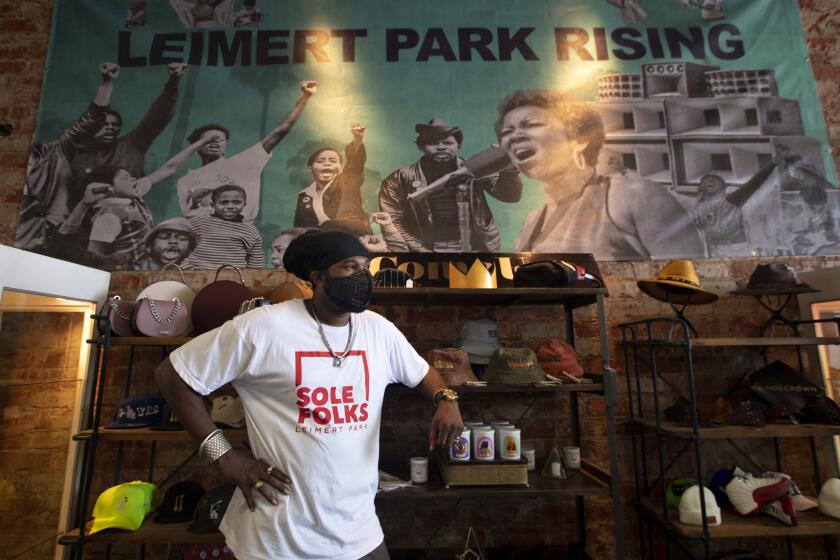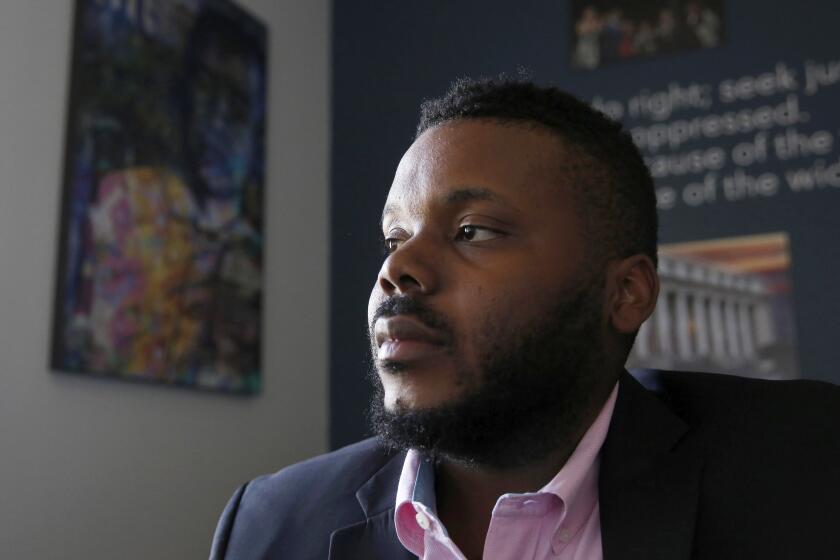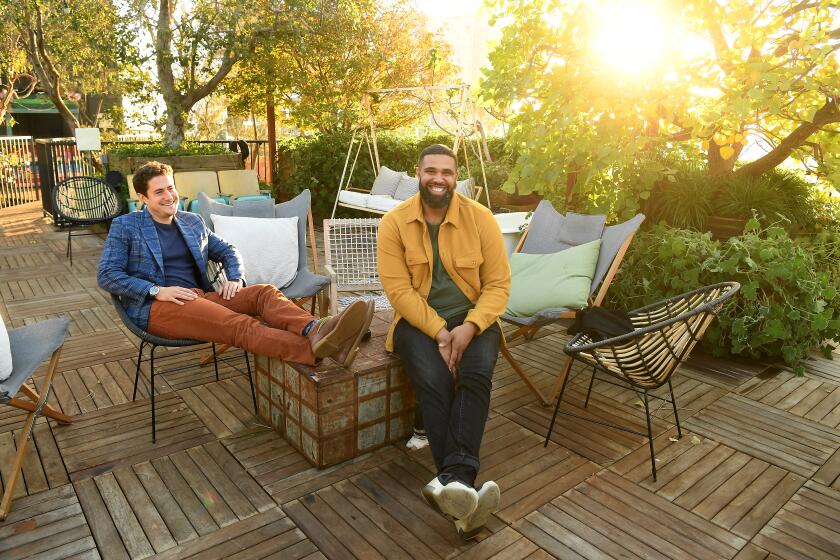- Share via
Akil West, owner of clothing store Sole Folks, has been trying to prod his six fellow tenants into working together on a deal to buy the commercial building in which they operate.
- Share via
The ceiling leaks when it rains. The floor is a little uneven. The lights don’t always work. And termites are chewing their way through the cracked walls.
But never mind all of that.
This low-slung, mural-covered building on Degnan Boulevard in the heart of Leimert Park is valuable. So valuable that it and the land on which it sits could help determine the future of Black Los Angeles.
On most days, Akil West remembers this and treats the commercial building — home to his clothing store, Sole Folks, and neighborhood institution Eso Won Books — with an almost hopeful reverence.
For months, he has been trying to prod his six fellow tenants into working together on a deal to buy all 11,708 square feet of it from its owner, BarKochba “BK” Botach.
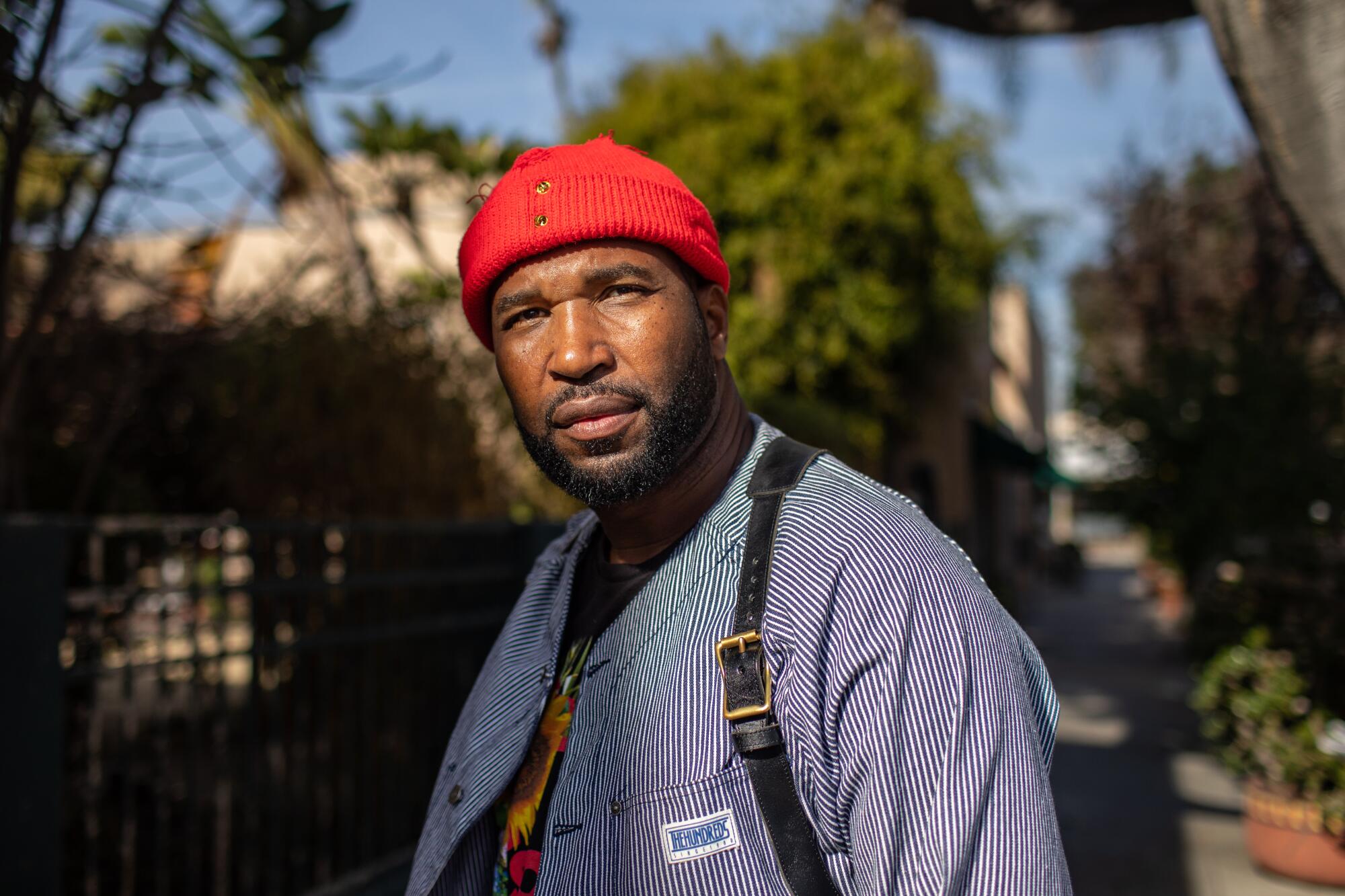
The price tag? An are-you-insane $6 million. That’s roughly double what Botach, a firearms dealer who has long irked activists in South L.A., wanted for it only a few years ago.
The increase speaks to L.A.’s notoriously overzealous real estate market, as well the building’s proximity to the soon-to-open rail stop on Metro’s new Crenshaw Line and the soon-to-be reopened Vision Theatre.
Leimert Park is gentrifying — and in a hurry.
After decades of restrictive racial covenants and disinvestment that depressed property values, homes are now selling for north of $1 million. Bidding wars among white families, who fared better than Black and Latino families during the COVID-19 pandemic, are common.
Meanwhile, Black activists are still smarting over last year’s loss of Baldwin Hills Crenshaw Plaza to a corporate developer. They wanted to turn it into a community hub. Instead it’ll be a collection of high-priced condos, stores, offices and restaurants, all less than a mile from Botach’s building on Degnan Boulevard.
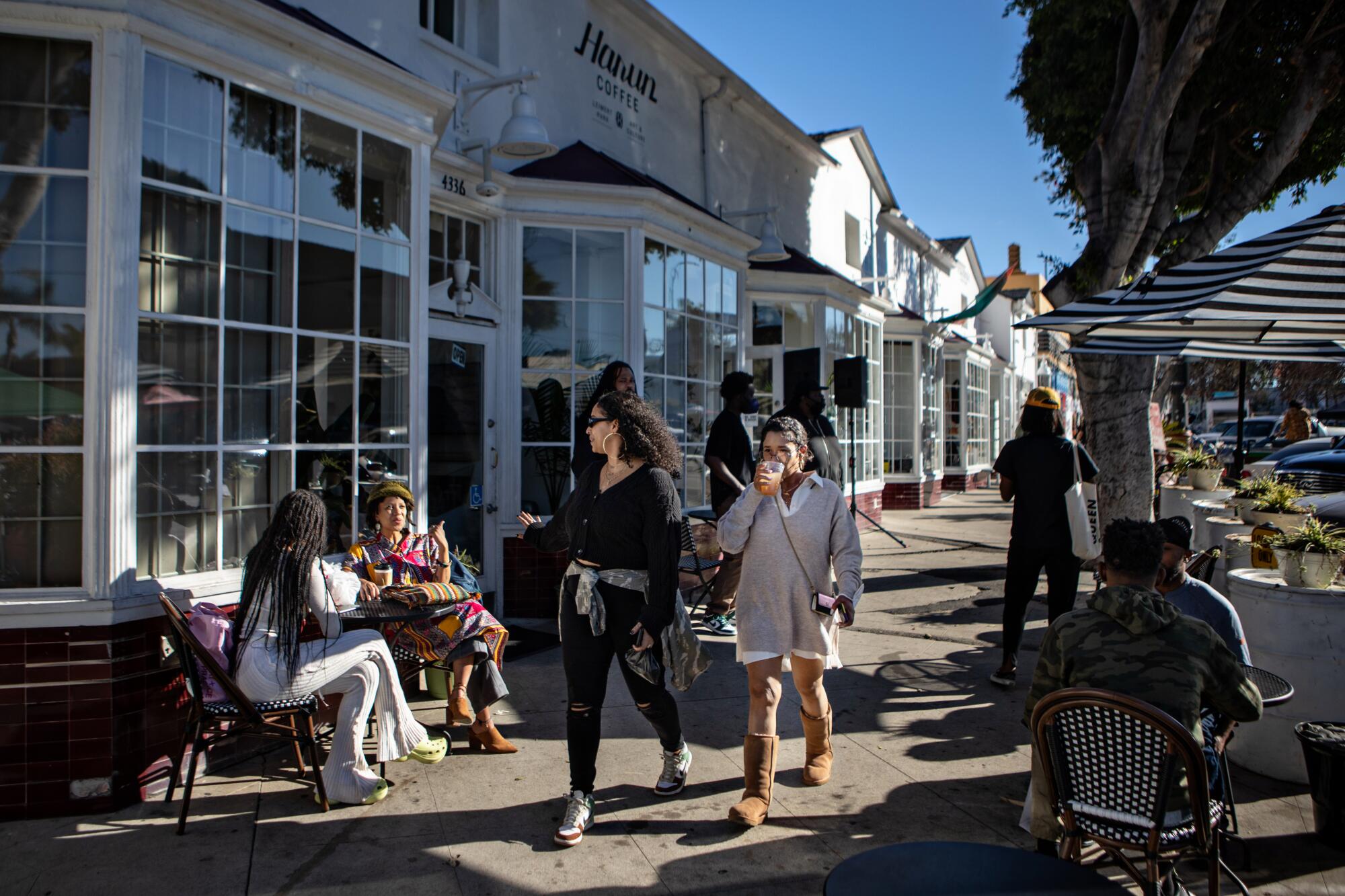
There is a real fear that Leimert Park’s tree-lined streets — where, for generations, Black Angelenos have gone to protest and to celebrate, and to engage in everyday expressions of culture and empowerment — could turn into something bland and expensive.
This, West says, is why he has been working so hard. As corporate developers increasingly pick off properties, he wants to put a proverbial stake in the ground for local ownership — and then use it to build more wealth in the neighborhood.
His deal is far from cooked, though.
The tenants, who must work together, are always on the verge of falling apart, their discussions marred by infighting. There are disputes over how best to redevelop the building and an adjacent parking lot, and questions about financing and ownership.
Heck, it’s even unclear whether Botach is willing to sell. A recalcitrant and secretive character, he keeps changing his mind.
With home prices topping $1 million, Black people who bought modest properties decades ago are realizing they are wealthy. All they have to do is keep them.
But if West can pull it off — and he believes he can — he’ll be right in line with a growing school of thought in a Black America suddenly focused on slowing the displacement of residents from cities, managing encroaching gentrification and closing the nation’s yawning racial wealth gap.
To do all of this, yes, more Black people will have to own homes, as that’s how most Americans build generational wealth. But to truly save and improve neighborhoods, we’ll also have to own more land and more commercial buildings where Black-owned businesses operate.
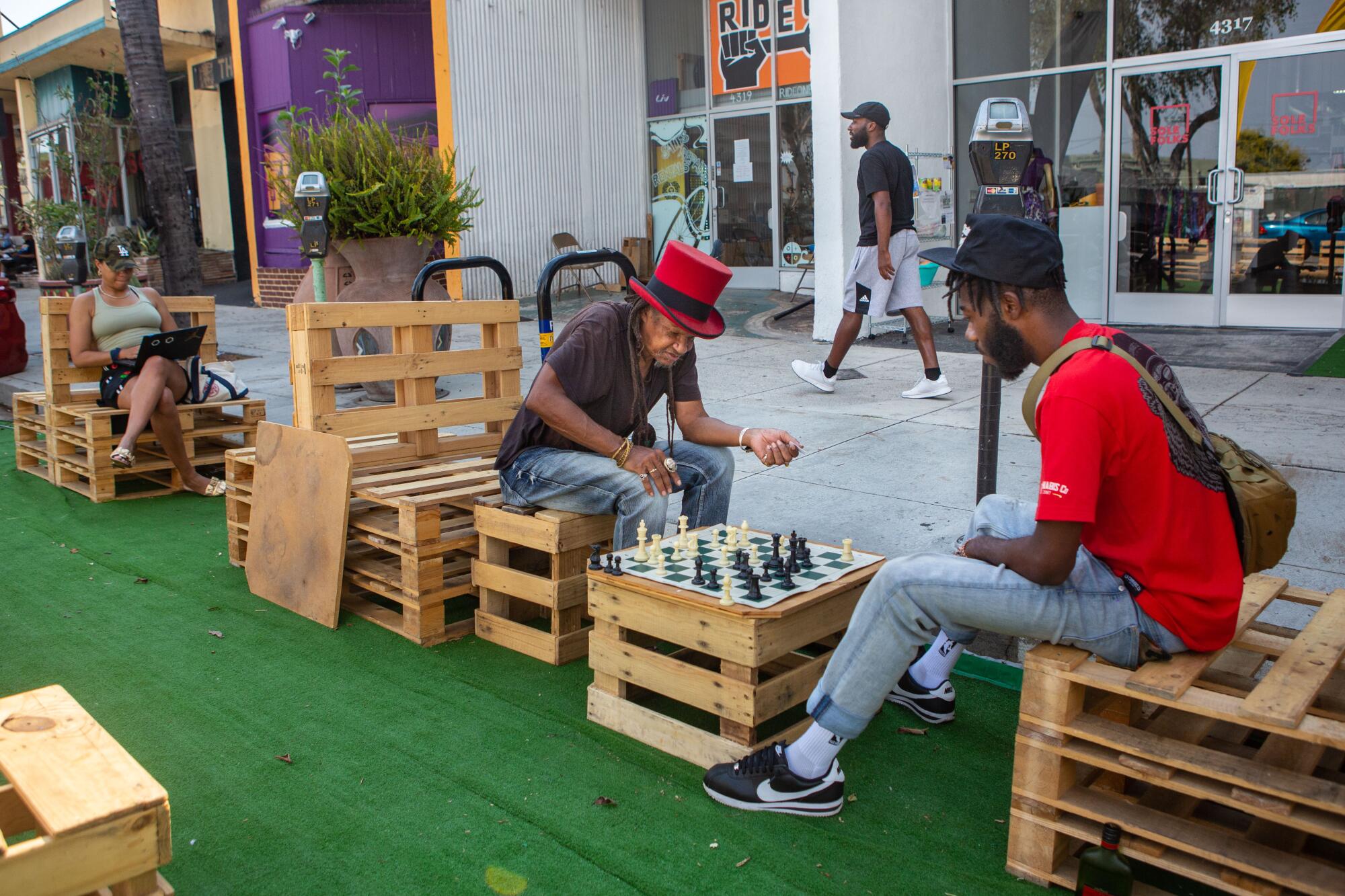
“We’ve got to figure out how we kind of re-anchor ourselves,” said Sandra Dungee Glenn, co-founder of the Collective, a consortium of equity-focused Black developers in Philadelphia. “Our theme is ‘real estate as a portal to change,’ using this idea of owning space and growing businesses that then have a ripple effect with other businesses ... to strengthen the economic life of the community.”
Sure, but what does it actually take — as the late South L.A. rapper and activist Nipsey Hussle preached — to buy back the ’hood in an American city? What kind of expertise? How much money? What level of determination?
I wanted to know. So, in recent months I’ve been following a number of Black Californians as they try to do just that. Despite the many strategies deployed — some grass-roots, some top-down — all share the same goal.
“It’s to hold the land and keep the land and trust it into the community,” West told me. “To foster Black entrepreneurship and Black homeownership, since we know that’s the only real tool for us to really gain wealth and hold it.”
::
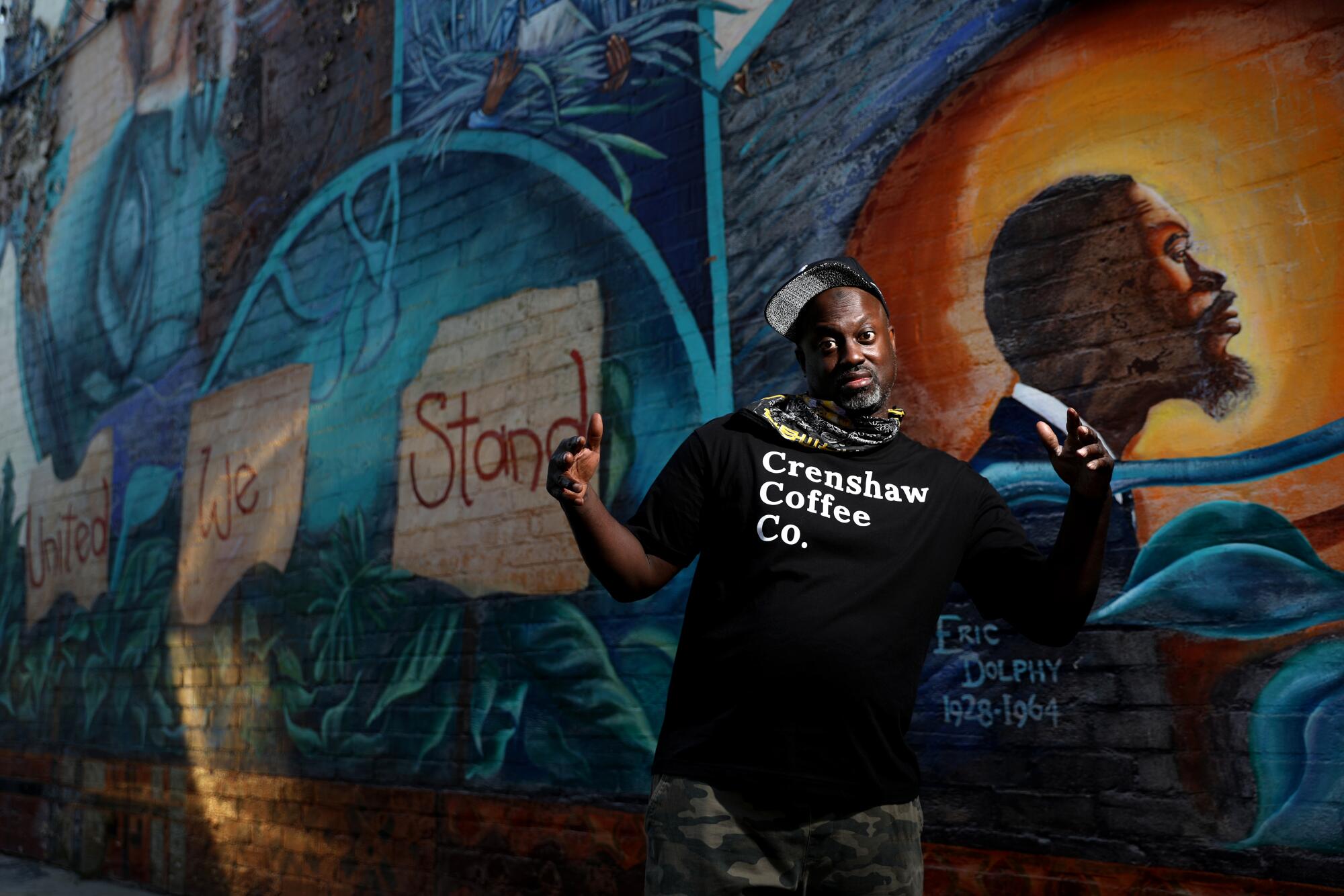
Ask longtime Leimert Park residents about the building on Degnan Boulevard, and they’ll tell you that many people have tried to buy it from Botach.
One of them is Tony Jolly, owner of Hot and Cool Cafe. But West didn’t know that when one day last summer he mentioned the idea during a debate over what the neighborhood should do for Juneteenth.
“I said to Tony, ‘Man, you know, we over here worried about what’s happening on June 19. We need to be worried about what’s happening on June 20,‘” West recounted. “I was like, ‘We need to buy this building.’”
Jolly was understandably skeptical. He told me later about the research he’d done after he and his wife, Tina Amin, had moved to Los Angeles from San Jose to open Hot and Cool Cafe in 2018. How he had even lined up a possible loan, only to find out he still couldn’t match Botach’s asking price.
But West, 49, is as persistent as he is charismatic. The longtime entrepreneur is full of big ideas, which he delivers with the rapid-fire delivery of a Brooklyn rapper, and has little patience for those who tell him no. And Jolly didn’t want to be the one tenant who told him no.
“Then at the end,” Jolly told me, “They’d be like, ‘Well, Tony didn’t want to do it, so now we can’t make history.’”
And so, within days, he found himself on Zoom calls with West and the other tenants to discuss whether they could buy the building. Botach, they learned, had just put it on the market again.
They ran through ideas.
West talked about his connections with Wells Fargo and how, with the right deal, it would be willing to issue a $2.5-million grant. In a statement, the bank said it had been working with “small businesses in Leimert Park” to provide support through its Open for Business Fund.
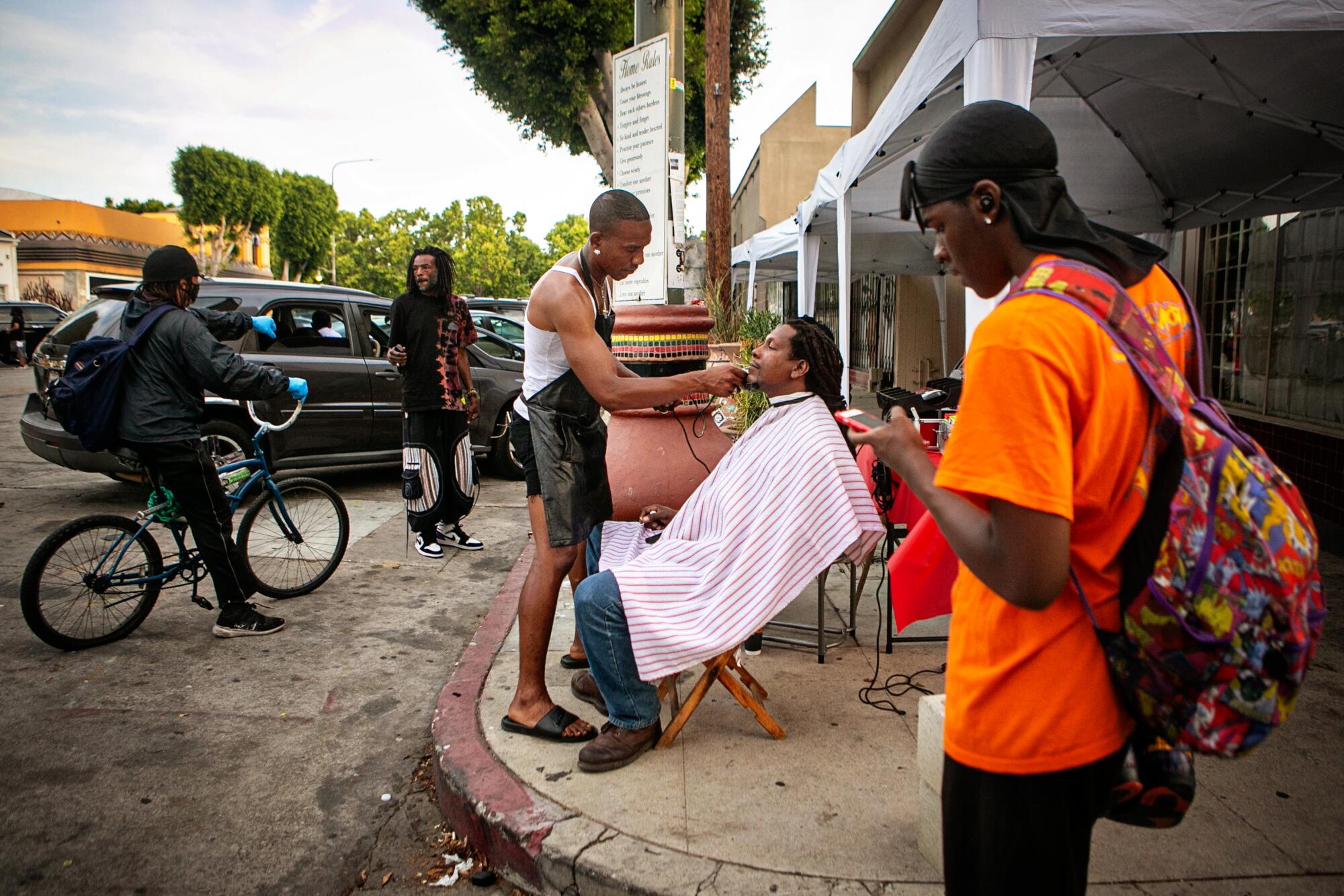
Jolly, meanwhile, shared details of his conversations with Genesis LA, the nonprofit community lender that offered to help him buy the building years earlier. The offer still stood under the right conditions.
Jordana Soares, owner of the Lion Arts & Entertainment, talked about Botach. In addition to being a tenant who wants to purchase the building, she works for him as a property manager and a real estate agent, talking to other prospective buyers. She tried to explain their complicated business relationship to me one morning in November.
“It’s disclosed. It’s transparent. And my agenda is very clear,” Soares insisted. Botach, meanwhile, declined multiple requests for comment.
James Fugate, who runs Eso Won Books, and Dwight Trible, executive director of the World Stage Performance Gallery, had little interest in becoming owners.
But Ade Neff of Ride On! Bike Shop/Co-Op, was all in. A tenant since the 1990s, when he watched blocks of South L.A. burn in the uprising, he called it “a necessary movement in a capitalist system” that doesn’t favor Black folks.
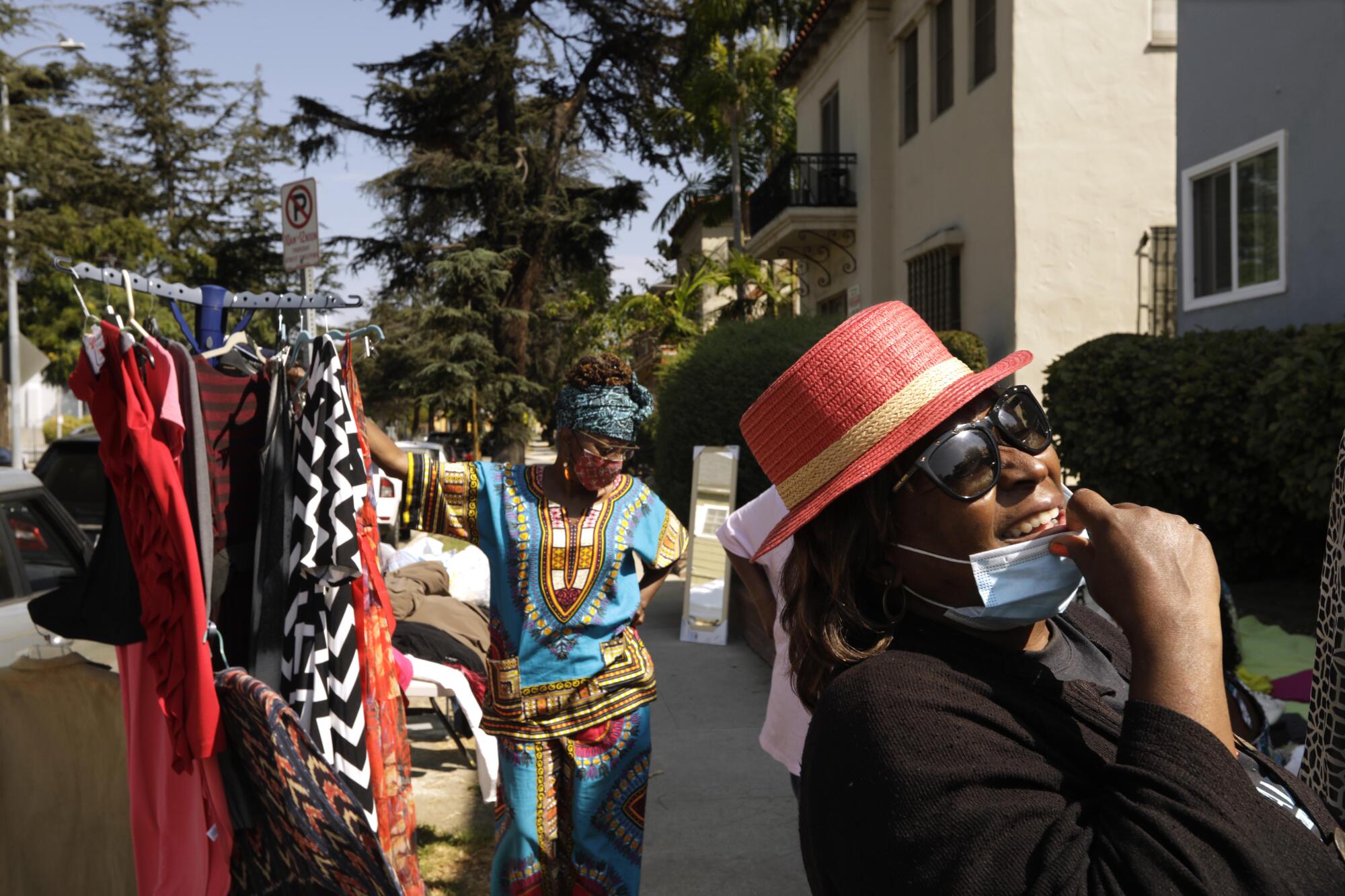
“We need to buy it in a way that we can secure something for the community,” Neff told me. “Form a land trust, a cooperative ownership so we can deal with this capitalist system without eating up everybody and abusing everybody.”
Before long, though, the tenants became like estranged siblings forced to work together to divvy up the inheritance of a wealthy relative who died without a will. They fought over everything.
Leave the building as is, namely falling apart? Or redevelop it? Leave it as a commercial property? Or expand it to include housing? And if there’s housing, should every apartment be affordable, or should it include market-rate options?
Sole Folks is a boutique that offers space for Black entrepreneurs to sell merchandise and for aspiring fashion designers to learn about the industry.
What quickly became clear was that they needed more money. Millions of dollars more.
Otherwise, the tenants-turned-owners wouldn’t be able to pay back the loan from Genesis LA without putting themselves and their businesses into deep debt. They also wouldn’t be able to convince Wells Fargo that it was making a sound investment with its grant money.
They considered a partnership with Downtown Crenshaw, which months earlier had raised millions of dollars for its failed bid to buy Baldwin Hills Crenshaw Plaza. Some tenants liked the idea so much that the community land trust put in a bid to buy the building from Botach. That deal ultimately fell apart, though, over objections from other tenants about who would own what.
After that, the only viable path forward seemed to be teaming up with an experienced developer. That way, the building on Degnan Boulevard could be torn down and rebuilt, adding housing as a source of revenue.
But that set off a new round of squabbles over whether every business could handle being displaced for years during construction.
“When we move out, how are we going to take all our customers with us?” Soares asked. “How are we going to do tenant improvements?”
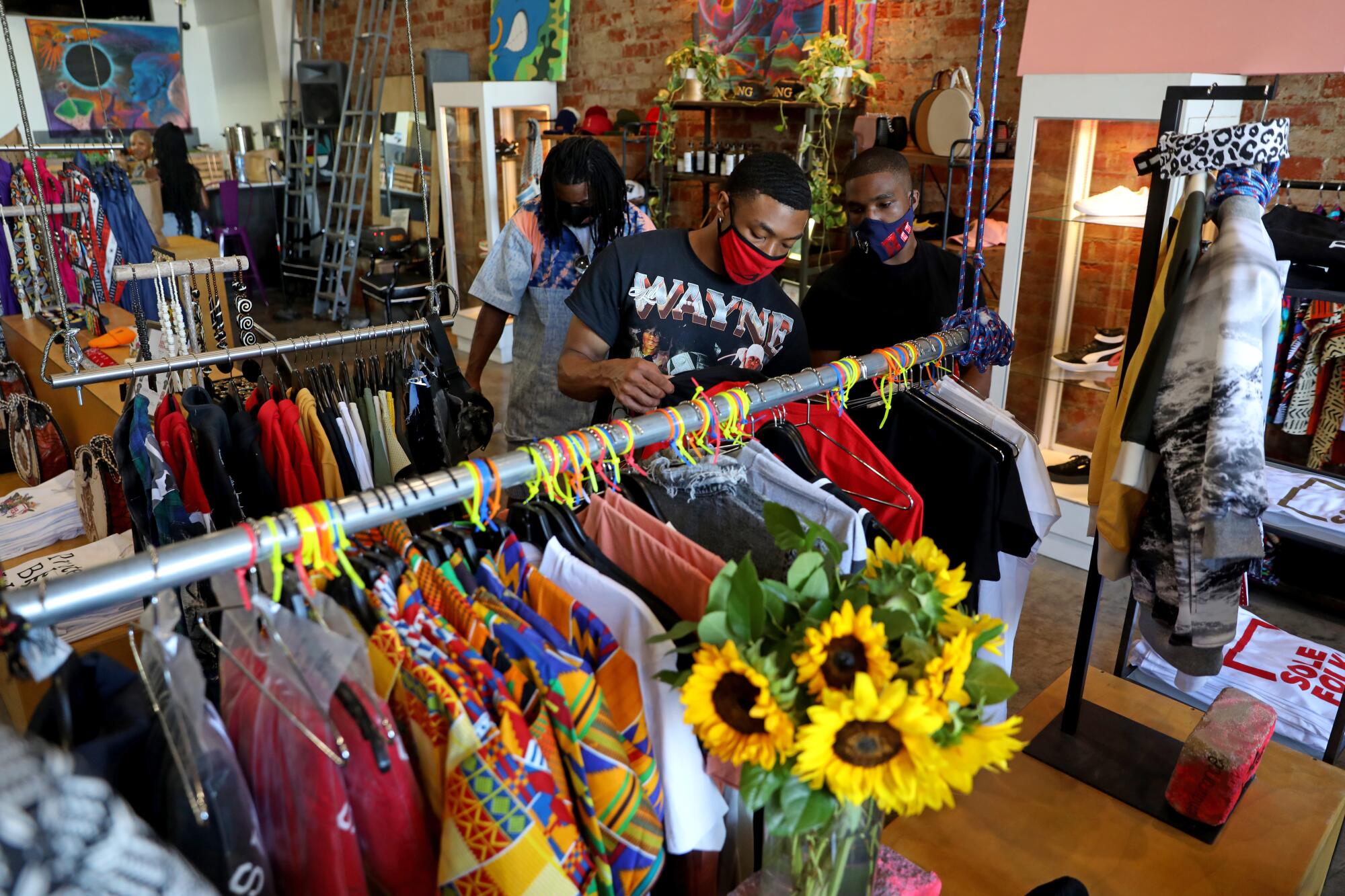
Developers have the expertise to raise capital and secure tax credits, navigate zoning and permitting laws, and hire engineers and architects — all of which ensures loans will be repaid and grants will be well spent.
Nevertheless, a potential deal with CRCD Partners never got off the ground. Several of the tenants didn’t like that the nonprofit developer wanted to take control of the affordable housing that would be built above their businesses, and that they stood little chance of seeing a profit from the redevelopment.
Through it all, Adrian Dove, who runs the Congress of Racial Equality of California, kept pushing a deeply unpopular plan to turn the building into a manufacturing hub.
Months came and went, and the tenants still couldn’t agree on a deal that would get them anywhere close to $6 million. So, in October, Botach took the building off the market again.
“I’ve always heard the stories about how, you know, property in Leimert Park would come up for sale and the people just wouldn’t come together to get it,” West told me after one particularly contentious round of negotiations. “It’s like crabs-in-a-barrel mentality.”
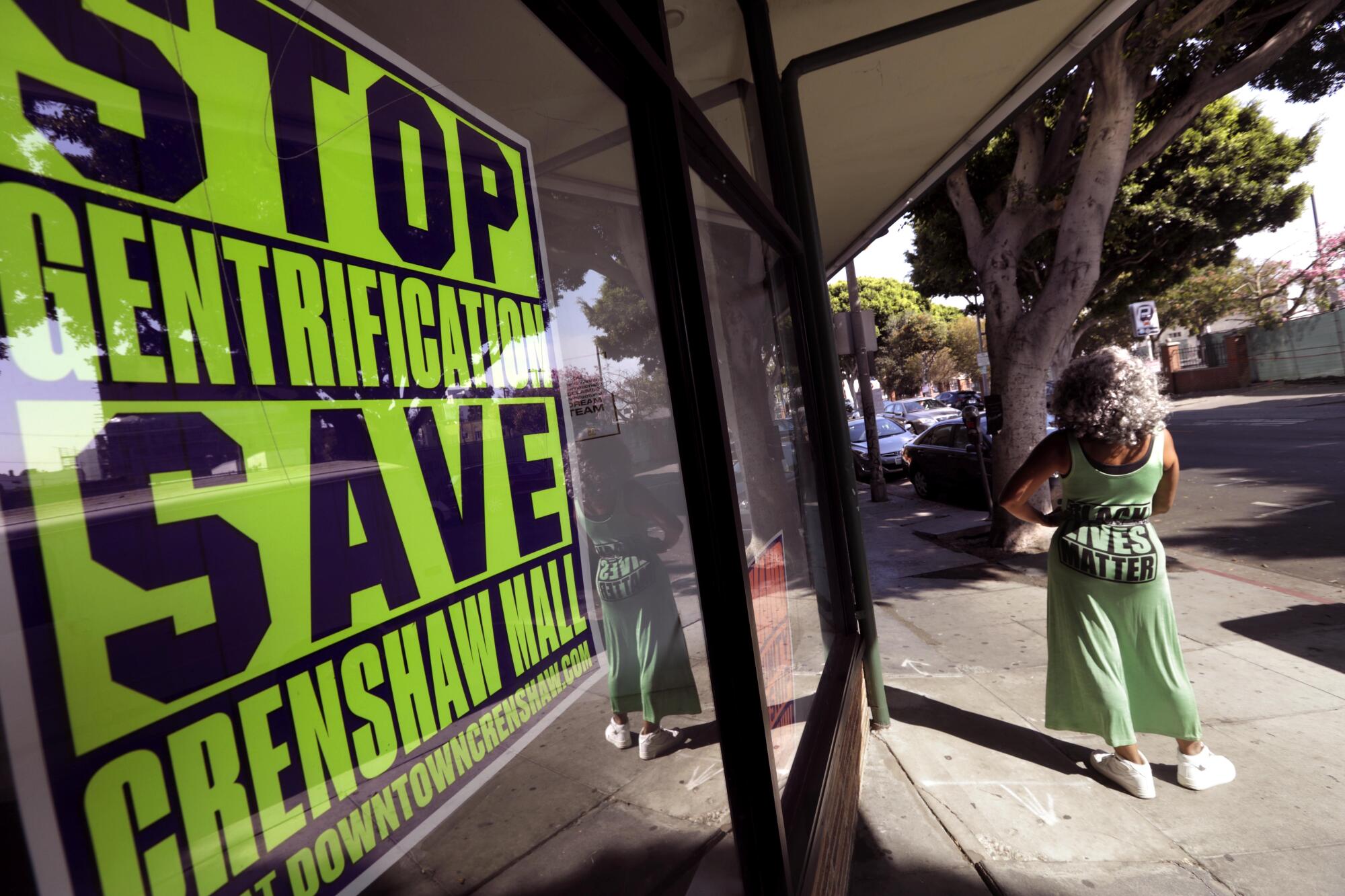
::
Tom De Simone, president and CEO of Genesis LA, told me such infighting happens a lot.
“The consensus-building process is laborious, time-consuming and isn’t always successful,” he explained.
But it’s just one of the many reasons grass-roots development deals don’t materialize, despite the often clear benefits for long-neglected communities of color. Most at fault are the systemic issues that disproportionately put Black people at a disadvantage financially.
Decades of redlining and covenants have created a wealth gap, with Black households worth just 12 cents for every $1 white households are worth.
A lack of access to capital also has made it hard for Black entrepreneurs to get the loans necessary to invest in property. The U.S. Federal Reserve found that they are denied nearly twice as often as white entrepreneurs, and when approved, pay higher interest rates.
This history has led to a large percentage of Black Americans who lack financial literacy skills, particularly, according to the National Urban League, when it comes to understanding risk and investing.
“We all have uncles and cousins who are like, ‘I’m gonna go buy a house and flip it and flip it and, before long, I’m gonna be bigger than Donald Trump,’” said Prophet Walker, a developer who grew up in Nickerson Gardens and co-founded the co-living company Treehouse. “But that’s way different than large-scale commercial development.”
Even as longtime residents are getting priced out, a small number of Black families who can afford it are moving in. The question is whether more will follow.
Unsurprisingly, the commercial real estate industry also has a diversity problem. A recent study found that more than 75% of top executives are white men. The banking and financial services industries aren’t much better.
All of these factors contribute to Black people being treated as high-risk applicants, perpetuating the lack of investment and local ownership in neighborhoods like Leimert Park.
It’s a cycle that’s getting more attention in American cities, prompted in part by the uneven fallout of the pandemic. In Philadelphia, for example, the economy is bouncing back and the housing market is booming.
“But most of that has been bypassing the Black community,” said Glenn, a community organizer and public policy leader. “Most of us are in neighborhoods with undervalued housing, little access to capital, inadequate services and declining homeownership.”
Sound familiar, Angelenos?
That led Glenn and two of her colleagues to found the Collective, which serves as a kind of mediator.
Using their clout in investment and real estate circles, the founders are raising $100 million to support seven Black-owned development companies. Each company is working on a commercial or residential project that would serve a need in a Black neighborhood.
“We have a really nice pipeline of Black developers here, and we’re thinking beyond just this generation. We’re thinking about succession planning,” Glenn told me. “How do we kind of institutionalize this?”
::
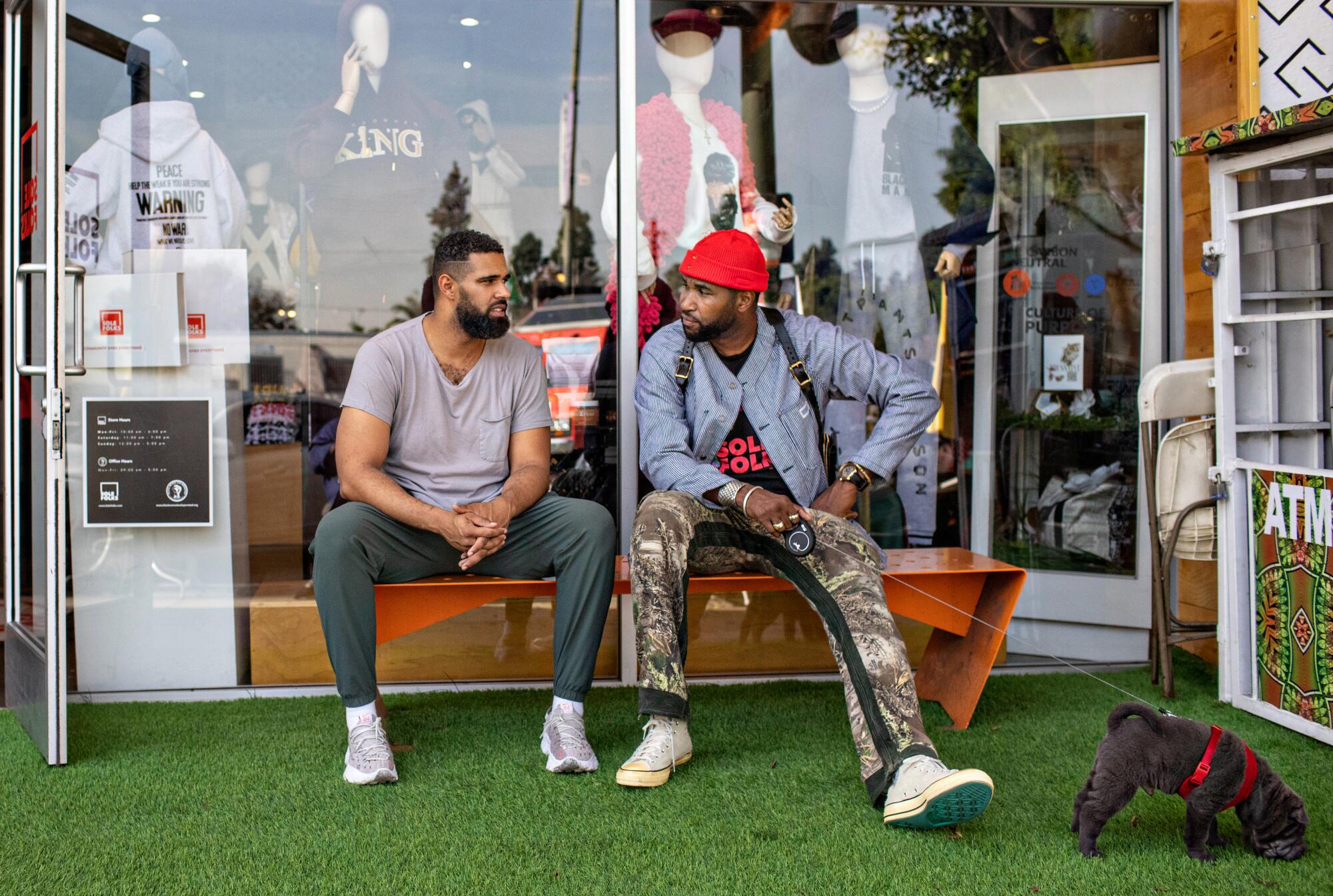
By early December, West had hit a wall. The tenants on Degnan Boulevard were no closer to a deal than they were in October.
He turned to longtime friend Walker, whose company recently bought a building a block over on Crenshaw Boulevard to develop as Treehouse Leimert Park.
Both men share a commitment to helping Black people build wealth. That’s probably because they both know what it’s like to have nothing.
West was a successful entrepreneur before he “picked up a habit” of stealing from houses during showings. He spent 14 years in prison. Walker was 16 when he was arrested for breaking someone’s jaw in a fight over a Discman. He spent six years in prison.
Both men have worked hard to rebuild their lives. West founded a nonprofit, Black Owned and Operated Community Land Trust, and used it and his celebrity connects to open Sole Folks, where dozens of designers sell their wares.
Walker enrolled at Loyola Marymount University, landed a job with Morley Builders, where he worked on high-profile development projects, and then ran unsuccessfully for state Assembly before co-founding Treehouse.
“I had to work for other people before I could even be trusted,” Walker said, while also acknowledging, “I skipped a lot of lines because the Obamas invited me to the State of the Union” as a guest in 2015.
An early Facebook investor and a formerly incarcerated real estate developer are building a network of co-living apartment buildings across Los Angeles with the utopian mission of reshaping what it means to live in an American city (and how to make money while doing it).
Today, both men are fearless about entrepreneurship, but also clear-eyed about what’s possible.
“There’s going to come a point where the owner of this property will be offered so much money from developers that it’s going to be stupid for him to deny it,” Walker said of the building on Degnan Boulevard.
He’d rather the tenants buy it than Botach wait it out for another decade. So, in January, he told them exactly how he would help.
Under a Treehouse-related team, PWC Developers, Walker is proposing a partnership to turn the building into a live/work, artist-focused complex with 35 apartments, ground-floor commercial space and a rooftop restaurant.
The building would be run co-op-style under West’s nonprofit, Black Owned and Operated Community Land Trust. And rather than rely heavily on government tax credits as CRCD Partners would have, Walker plans to tap “mission-aligned investors.” That would allow more flexibility on the timeline and design of the redevelopment, and a greater potential for the tenants-turned-owners to earn a profit and build equity.
There’s some evidence Walker can pull this off.
To get Treehouse going, he and partner Joe Green had to do something similar, relying on personal relationships and then building a pool of prominent investors, mostly from the tech world.
I have little doubt the same could be done to ensure there’s a majority Black ownership of a valuable building in Leimert Park. There would almost certainly be interest from people in the entertainment and business sectors of Black Los Angeles — monied circles in which both Walker and West have friends.
As he campaigns for a state Assembly seat, Prophet Walker, 26, is building on his rise out of L.A.’s Nickerson Gardens.
“I don’t even want ownership,” Walker told me. “I’m committed to being a partner.”
Jolly is on board with that. So is Neff, saying such a deal would be “monumental” for Leimert Park, especially since Baldwin Hills Crenshaw Plaza is no longer in the community’s hands.
Dove told me he doesn’t know the details of this latest plan, but he’s open to being an owner. Still, he would prefer to use the building for manufacturing cellphones rather than for retail or housing artists.
“We’ve got artists all over L.A.,” he griped. “Everybody says they’re an artist.”
Trible supports whatever deal gets a consensus, but only wants to be a tenant.
Soares, meanwhile, still wants to be an owner. But as opinions have hardened over the months of discussions, she has grown skeptical of West. She doesn’t like that he came up with the deal on his own, or that he had independent discussions with lenders and developers.
“We need to be a collective, not a pretend collective,” Soares told me. That’s why she doesn’t believe his plan will win over the other tenants. “I want the best for the community, but Akil buying this building and putting under his nonprofit, I don’t believe is the best.”
Fugate agrees. He doesn’t want to be an owner, but prefers that Soares take the lead on coming up with a deal.
In the meantime, a deadline is fast approaching. The building is still officially off the market. And if the tenants can’t agree on an unsolicited offer that Botach will accept by the end of March, Wells Fargo will send its grant money elsewhere.
At some point, for the sake of preserving Black neighborhoods, the perfect can’t continue being the enemy of the good.
“You might not get everything you want,” De Simone said. “But if you can’t come to some reasonable consensus in the short run, the window of opportunity may close altogether. And then you’ve got nothing.”
West is determined not to let that happen. Not again on Degnan Boulevard.
More to Read
Sign up for Essential California
The most important California stories and recommendations in your inbox every morning.
You may occasionally receive promotional content from the Los Angeles Times.
